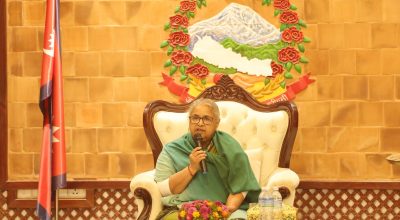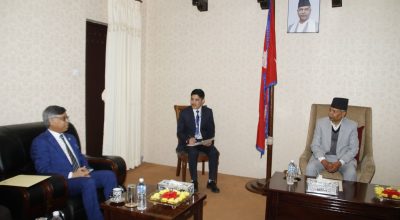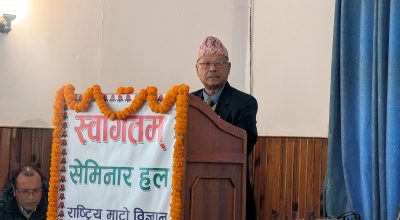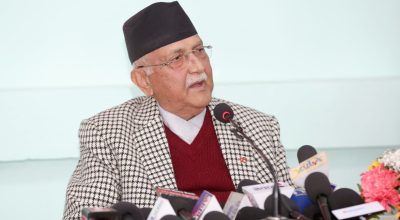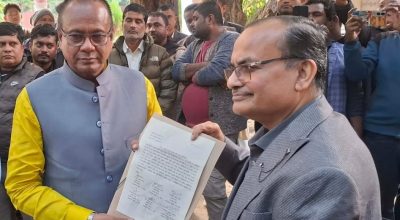
Kathmandu, May 18: The civil administration will be made agile, result-oriented and professional by implementing Federal Civil Service Act soon. Provincial civil service and local service will be systematized. Service delivery will be made further smooth, accessible and easy by strengthening administrative functional interrelationship among three tiers of government.
Government Integrated Office Management System based on information technology will be implemented while removing duplication in the organizational structure to make public service delivery smooth and cost-effective. The cost, time and quality of service will be improved by removing hassles while receiving services by citizens.
Token and time card system will be implemented in government service delivery.
Passport services will be provided to Nepalis residing at home and abroad in an easy and convenient manner. Consular services including rescue, legal assistance and counselling and repatriation of Nepalis in problem will be made effective.
Government employees will be made professional, motivated and with high morale by making their terms and facilities timely, attractive, predictable and equitable. Training effectiveness will be augmented through re-structuring and integration of training institutions of similar nature based on certain standards.
Employee performance contract will be made objective and measurable.
Zero tolerance against corruption
Inclusive economic and social transformation will be achieved through institutional strengthening of the constitutional bodies for mainstreaming of the deprived classes and the protection of rights of the targeted groups. Special programmes will be conducted for socio-economic and cultural development and empowerment of the marginalized and backward regions of Terai-Madhesh.
Institutional arrangements will be made for establishing the Authority for upliftment and development of Dalit, marginalized and oppressed class to guarantee constitutionally-provisioned rights of the Dalit community, while also ensuring employment and livelihood including modernization of their indigenous skills, knowledge and profession by integrating the existing institutions. “Craftsmanship Entrepreneurship Special Program” will be conducted in all seven provinces to modernize and commercialize traditional skills, knowledge and profession of Dalit community.
Special programme will be implemented for the upliftment of Muslims, backward class and indigenous nationalities.
Zero tolerance against corruption will be adopted by strengthening regulatory bodies with necessary law, manpower, means and resources. Province and local level governments will also be made accountable for implementing strategies and action plans related to corruption control. Promotional, preventive and curative measures will be adopted in an integrated form by identifying high corruption-prone areas. New national strategy and action plan will be implemented to effect the United Nations Convention Against Corruption and the commitments made by Nepal in this regard.
Commission for the Investigation of Abuse of Authority (CIAA) will be further strengthened as a competent institution to maintain good governance and to carry out objective investigation, research and prosecution on corruption-related acts. The National Vigilance Centre will be further strengthened to carry out preventive and promotional measures related to corruption control. This centre will be developed as a more capable organization for technical testing of the quality of development projects with legal arrangements.
Fraud, unfair transactions including usury, economic and financial crimes like forgery and illegal activities like improper exploitation of public property and resources will be strictly controlled.
Fiscal discipline and financial accountability will be strengthened at all three tiers of government by making audits objective and credible. The task of clearing the irregular amount in public bodies will be carried out as a campaign. Compliance of financial discipline will be the basis of performance evaluation of the officials of the public entities.
Mechanism related to control and prevention of financial investments in money laundering and financing in terrorism will be made resourceful. Nepal’s international commitments against money laundering and financing of terrorism will be implemented.
Bilateral agreements will be made with the relevant countries for the implementation of laws related to mutual legal assistance and extradition.
Democracy will be strengthened by institutionalizing a clean, free, fair, reliable and cost-effective election system. The use of information technology in election management will be enhanced. Policy reforms will be initiated to manage the regulatory system of political parties. Necessary legal and administrative arrangements will be initiated to ensure the voting rights of Nepali citizens living abroad.
In addition to continuing the investigation and preservation of properties owned by the former royal family, a professional and strategic plan will be implemented for the proper utilization of the acquired properties.
An independent and balanced foreign policy will be pursued, while safeguarding national interests, independence, territorial integrity and protection of sovereignty and economic prosperity. Foreign relations will be conducted on the basis of the Charter of the United Nations, non-alignment, the principles of Panchasheel, international law, and norms of world peace while maintaining a distinct international identity of the country.
National consensus will be reached on fundamental issues of nationality, national security, foreign relations, strategic infrastructure and socio-economic transformation. Diplomatic initiatives will be undertaken to resolve boundary issues.
Nepal’s role in multilateral forums and institutions including the United Nations will be strengthened.
Advocacy will be done on international issues for promoting the interests of Nepal and Nepalis. Initiatives will be taken to increase Nepal’s representation in leadership positions at various international forums.
Institutional capacity will be strengthened to conduct economic diplomacy for promoting foreign investment and trade, employment and tourism. Knowledge, skills, capital, technology, network and access of Non Resident Nepalis will be utilized for the development and prosperity of Nepal.
This policy and program of the government of Nepal for the fiscal year 2081/82 has internalized the aspirations of the people for good governance, social justice and prosperity while effectively implementing the directive principles, policies and obligations of the State.
This policy and program will contribute to building a strong and self-reliant economy by increasing investment in areas that contribute to high,
sustainable and inclusive economic growth. Through the implementation of this policy and program, services such as security, social protection, education, and health will be made easily accessible to citizens and help maintain social justice. This will improve the quality of life of the citizens and help transform the nation into a middle-income developing country by addressing high expectations of the people towards development and good governance.
The government is firmly determined to advance the country towards good governance and progress through a democratic and political system accountable to people while consolidating the Federal Democratic Republican governance system established by the great sacrifice and struggle of the Nepali people.
The government will further improve its working approach by making it more agile, result-oriented and citizen-friendly in order to fulfill the aspirations of the citizens for good governance, development and prosperity and to enhance the country’s dignity at the international level by implementing the policies and obligations of the State as directed by the Constitution and the prevailing laws, as well as the minimum policy priorities and common commitment of the political parties participating in the government.





